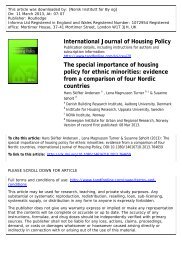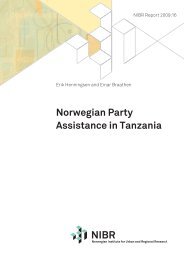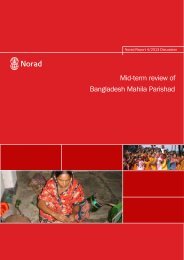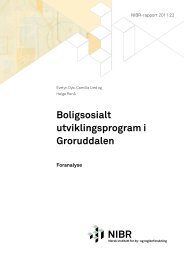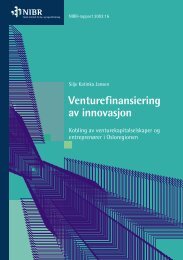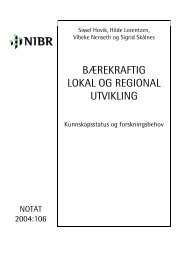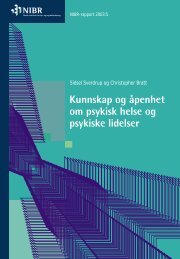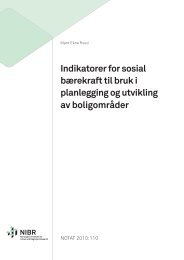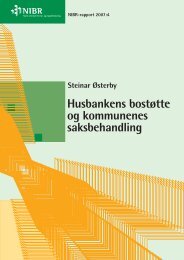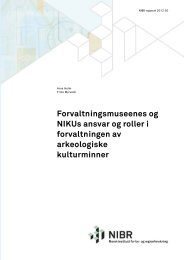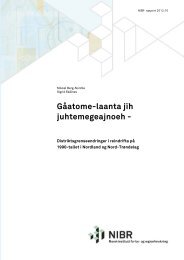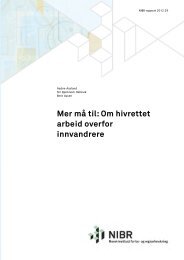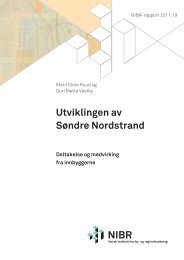Evaluation of the Southern and Eastern Africa Regional Centre for ...
Evaluation of the Southern and Eastern Africa Regional Centre for ...
Evaluation of the Southern and Eastern Africa Regional Centre for ...
- No tags were found...
You also want an ePaper? Increase the reach of your titles
YUMPU automatically turns print PDFs into web optimized ePapers that Google loves.
<strong>of</strong> regional collaboration itself. The project document <strong>for</strong> this phase states- ‘<strong>the</strong>development <strong>of</strong> a truly regional Masters’ is <strong>the</strong> key focus but does not justify why thisis needed. The application draws on <strong>the</strong> 2001 evaluation to justify ‘institutionalisation<strong>of</strong> regional cooperation’, but without exploring why this is required. The‘Constitution’ document <strong>for</strong> SEARCWL, also only states ‘it should take <strong>the</strong>opportunity to create a truly regional programme’, but again <strong>the</strong> end is not identified,nor <strong>the</strong> means to get <strong>the</strong>re.Underpinning all <strong>of</strong> <strong>the</strong> above points, <strong>the</strong> programme documents reflect <strong>the</strong>explicitly academic role <strong>of</strong> <strong>the</strong> centre. Even this emphasis, however, assumes thatacademic activities will develop <strong>the</strong> discipline. The critical link here is, <strong>of</strong> course, <strong>the</strong>wider assumption that <strong>the</strong> discipline – both through <strong>the</strong> course <strong>and</strong> academicdevelopment- will lead to legal <strong>and</strong> social status improvement. SEARCWL <strong>of</strong>course cannot be at any fault <strong>for</strong> conceiving <strong>the</strong>mselves as an academic centre whoseprimary function is to develop a regional Masters programme. On <strong>the</strong> contrary, thisemphasis on its teaching <strong>and</strong> educational m<strong>and</strong>ate <strong>and</strong> objectivity <strong>and</strong> independencecan be considered a valuable if not necessary commodity in <strong>the</strong> politically unstablecontext that has characterised Zimbabwe. None<strong>the</strong>less, in view <strong>of</strong> <strong>the</strong> Programme’sdevelopmental goals <strong>the</strong> <strong>Evaluation</strong> Team considers it is important to evaluatewhe<strong>the</strong>r <strong>the</strong> gaps between <strong>the</strong> course <strong>and</strong> research in relation to broader desiredimpact have been anticipated <strong>and</strong> dealt with by SEARCWL. It is <strong>the</strong>re<strong>for</strong>e surprisingthat <strong>the</strong> issue <strong>of</strong> how <strong>the</strong> course was intended to bring about development orimproved status <strong>of</strong> women is an omission in <strong>the</strong> programme documents.1.2.3 Summary <strong>of</strong> previous evaluations <strong>and</strong> mid-term reviews (MTRs)The SEARCWL’s work has been evaluated several times. <strong>Evaluation</strong>s took place in2001, 2007, <strong>and</strong> most recent mid-term review in 2010. The MTRs <strong>and</strong> evaluations aregenerally very positive to <strong>the</strong> Master’s in Women <strong>and</strong> <strong>the</strong> Law (MWL). There aresome useful findings. There is useful mention <strong>of</strong> <strong>the</strong> recommendations <strong>for</strong> analumnae association suggested by students <strong>and</strong> also <strong>for</strong> in<strong>for</strong>mation disseminationabout <strong>the</strong> course, amongst o<strong>the</strong>rs. Contribution <strong>of</strong> graduates is mentioned but is notsystematically presented, nor how representative it is <strong>of</strong> <strong>the</strong> graduates. Fur<strong>the</strong>rmore,<strong>the</strong>re is nei<strong>the</strong>r discussion <strong>of</strong> <strong>the</strong> assumptions highlighted nor <strong>the</strong> role <strong>of</strong> <strong>the</strong> <strong>Centre</strong>itself, nor <strong>the</strong> discipline <strong>of</strong> women’s law. Reference is made to some graduate studentobservations that <strong>the</strong>y thought <strong>the</strong> <strong>Centre</strong> could be more active in acting as a legaladvisor to organisations but this does not lead to exploration <strong>of</strong> impact. These areparticularly interesting because <strong>the</strong>y all could <strong>for</strong>m activities that potentially harnessadded value beyond <strong>the</strong> Master’s course itself. The 2007 evaluation, as stated, alsodid not pick up on <strong>the</strong> issue <strong>of</strong> broader impact <strong>and</strong> means to achieve this. The 2010MTR, in line with previous evaluation, alluded to <strong>the</strong> contribution <strong>of</strong> <strong>the</strong> <strong>Centre</strong> as‘substantial’. It also suggests <strong>the</strong> <strong>Centre</strong> is a ‘true regional hub’ <strong>and</strong> with a genuineregional character. The discussion about <strong>the</strong> desirability or purpose <strong>of</strong> being regionalis again omitted.But what is different in <strong>the</strong> findings <strong>of</strong> <strong>the</strong> 2010 MTR is that by way <strong>of</strong> conclusionsome allude to areas that could contribute to broader impact in terms <strong>of</strong> growing itslinks with employers <strong>and</strong> <strong>for</strong>mer graduates in particular <strong>and</strong> in better publicity <strong>and</strong>dissemination in an overall finding. What is particularly relevant <strong>for</strong> <strong>the</strong> current15



